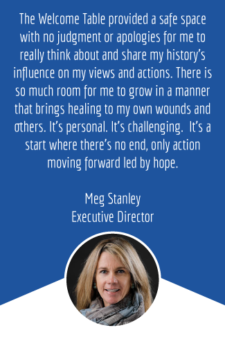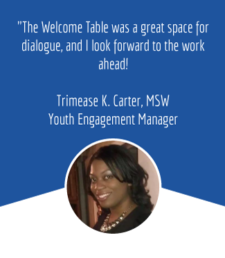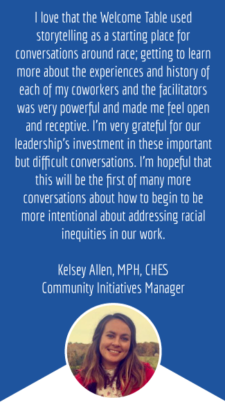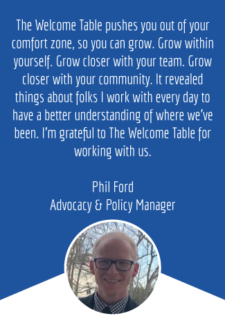 In the public health world, our work focuses on improving the health of everyone in our communities regardless of race, gender, sexual identity, nationality, socioeconomic status, educational attainment, veteran status, age, physical ability, and many more expressions of identity. The work we do requires putting aside personal, political, religious, and other views to focus on the greater good of individuals and humanity.
In the public health world, our work focuses on improving the health of everyone in our communities regardless of race, gender, sexual identity, nationality, socioeconomic status, educational attainment, veteran status, age, physical ability, and many more expressions of identity. The work we do requires putting aside personal, political, religious, and other views to focus on the greater good of individuals and humanity.
Eat Smart Move More South Carolina staff recently had an opportunity to delve into equity, inclusion, and diversity by examining the root causes of our behaviors – how we were raised, how we think, and why we think the way we do. During three sessions of The Welcome Table, Jennifer Gunter, Ph.D., director, South Carolina Collaborative for Race and Reconciliation, and Latesha Murray, facilitator for The Welcome Table, led a discussion to understand and talk  about racial divisions that have hampered unity and social justice. The Welcome Table is a safe place that fosters mutual respect, listening and learning from each other and are based on trust and perseverance. The discussions are also confidential.
about racial divisions that have hampered unity and social justice. The Welcome Table is a safe place that fosters mutual respect, listening and learning from each other and are based on trust and perseverance. The discussions are also confidential.
One topic covered in the trainings was unconscious bias, the underlying attitudes, and stereotypes that people unconsciously attribute to another person or group of people that affect how they understand and engage with a person or group. For instance, we show a preference for people we are similar to in some way because we find them familiar and easier to relate to.  This could be because of shared characteristics – such as class, ethnicity, or geography – or shared interests or hobbies.
This could be because of shared characteristics – such as class, ethnicity, or geography – or shared interests or hobbies.
At work, this could lead us to feel that someone is not talented, or not right for a role, because we don’t have the same characteristics or experiences in common. How do we fix this? Widen the work circle by working with a more diverse range of people and get to know them individually. This will help to improve cultural competence and lead to a better understanding of others.
Tackling equity issues requires an understanding of the root causes of outcome disparities within our society. Inclusion is the act of creating environments in which any individual or group can be and feel welcomed, respected, supported, and valued to fully participate. A diverse team is only part of what makes a more equitable workplace. Making sure that different voices are heard, that people feel respected  and valued, and that they are in environments where they can do their best work, is where inclusion comes in.
and valued, and that they are in environments where they can do their best work, is where inclusion comes in.
Creating diverse teams – employees, committees, workgroups, boards, and other collective groups – is important for hearing ideas from people with different perspectives and experiences, which leads to more strategic work and outcomes in our public health work. Diversity can also foster stronger alliances, a more complete understanding of the issue being addressed, and improved collaboration to achieve a common goal.
For more information about The Welcome Table or to schedule a training for your organization, contact the University of South Carolina’s Office of Diversity and Inclusion.
